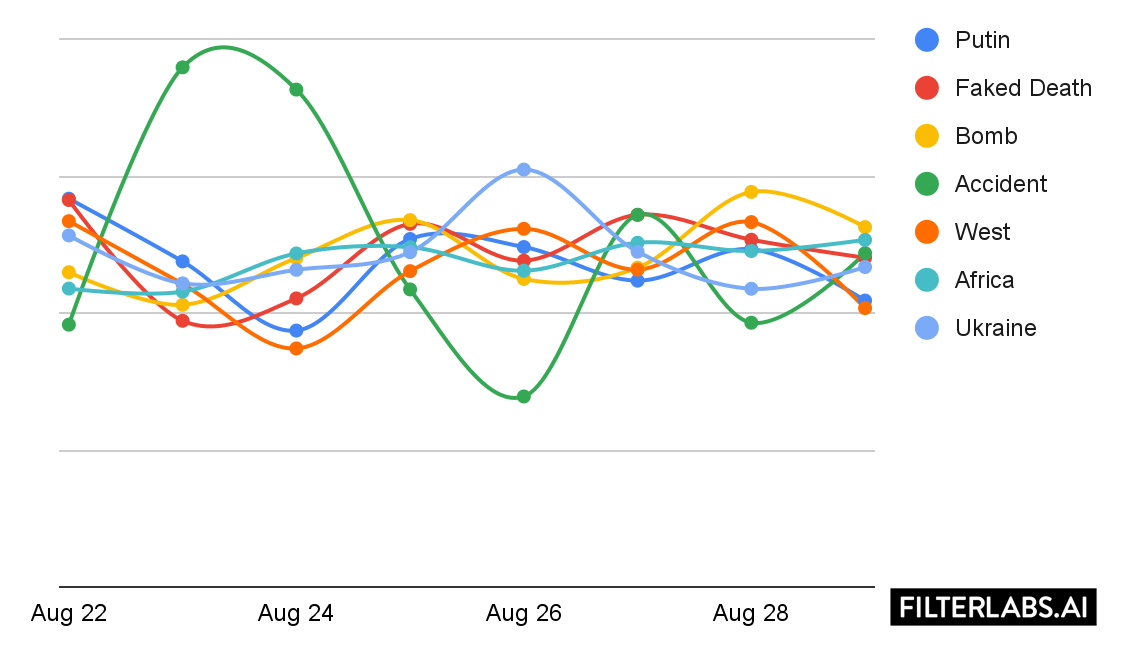Who Killed Yevgeny Prigozhin?

The strange career of Yevgeny Prigozhin has come to an abrupt end.
On August 23rd, exactly two months after Prigozhin led a brief and quixotic rebellion against the Russian military, the mercenary commander of the Wagner Group died in a plane crash on the way from Moscow to St. Petersburg. The plane apparently held Prigozhin; his second-in-command, Dmitry Utkin; the Wagner Group’s chief logistics officer, Valery Chekalov; and several bodyguards.
Initial American intelligence reports suggest that the plane was brought down by a planned explosion.
On Russian state and social media, it was a different story. As FilterLabs.AI chief executive Jonathan Teubner told the New York Times, by the afternoon of the 24th the dominant opinion on Russian official and social media channels was that the crash must have been an accident.
For several weeks Russian news articles and social media posts have openly speculated about the Wagner Group commander’s likely fate. Plenty of observers thought Prigozhin would meet a sudden end, but they were divided as to how, and who would be to blame. Because FilterLabs monitors and ingests online discourse, we were able to sample this online communication and track the trends of the various narratives. We began analyzing narratives around his death on the day of the crash.
As the August 22 data in the chart below illustrates, there were already numerous views on how Prigozhin might die:
However, by the end of the day of the actual crash, August 23rd, the number of articles explaining the event as an “accident” shot up. This, Teubner told the Times, might well have been a coordinated push from the Kremlin. By Thursday the 24th, state media outlets were actively promoting this interpretation.
A similar pattern appeared on social media:
Once again, speculation about how Prigozhin might die varied. However, here too, by the end of August 23rd, after his death was announced, the “accident” explanation had outpaced the others. If anything, the campaign on social media appears to have been even more widespread and effective than the mainstream media campaign. About 25% of the social media articles and posts purporting to explain the crash now suggested it was an accident.
Interestingly, the shift to this position does not seem to have been immediate. Right after the crash was made public, media channels sympathetic to the Wagner Group blamed the Russian government, and even Putin by name.
Some state-backed media channels immediately turned their attention to the West. A military correspondent hinted darkly that “any forceful actions of the enemy on the ground are always accompanied by information and psychological influence in the media sphere”—as if the plane had been brought down by Western agents, who were now sowing dissension online.
Others blamed mechanical failure, saying it was a foreign plane and poorly maintained. Still others thought a bomb might have been placed on the landing gear and detonated in midair.
By the evening of the 23rd, a plurality of posters’ in both news and social media had settled on the accident explanation, as seen in FilterLabs’ analysis. But only a few days later, consensus had fallen apart again. This suggests that the accident narrative never actually took hold.
And this may in fact be the most surprising finding in this strange tale. In recent years, the Kremlin has been an expert manipulator of its own information environment. Is it possible that Putin’s hold on the media landscape is not as strong as we suspected? [We’ll be watching this carefully in the coming weeks. Stay tuned!]
Whatever the official explanation, the plane crash brings a wild chapter of the Russia-Ukraine conflict to a close. The Wagner Group was a major player in Russia’s assault on Ukraine from the beginning. Prigozhin’s video messages raised his profile to dizzying heights and, after his social media stardom went to his head, he hubristically thought that he could impose his will on the Russian state.
Once the insurrection failed, did he know his days were numbered? At first everything went surprisingly well. A few days after the rebellion he was chatting with Putin at the Kremlin. As recently as last week, he was making his trademark videos, saying that he and his mercenaries would make “Russia greater on all continents, and Africa even freer.”
And now he’s gone. Speaking for the emerging consensus in Russian state-sponsored and social media on the 23rd, pro-Kremlin journalist Sergey Karnaukhov said, “I couldn’t even explain to myself that he just died ridiculously! Maybe in the process of investigation there will be no traces of explosives, no traces at all, and we will have to get this into our heads.”
That’s their story. Let’s see if they stick to it.
